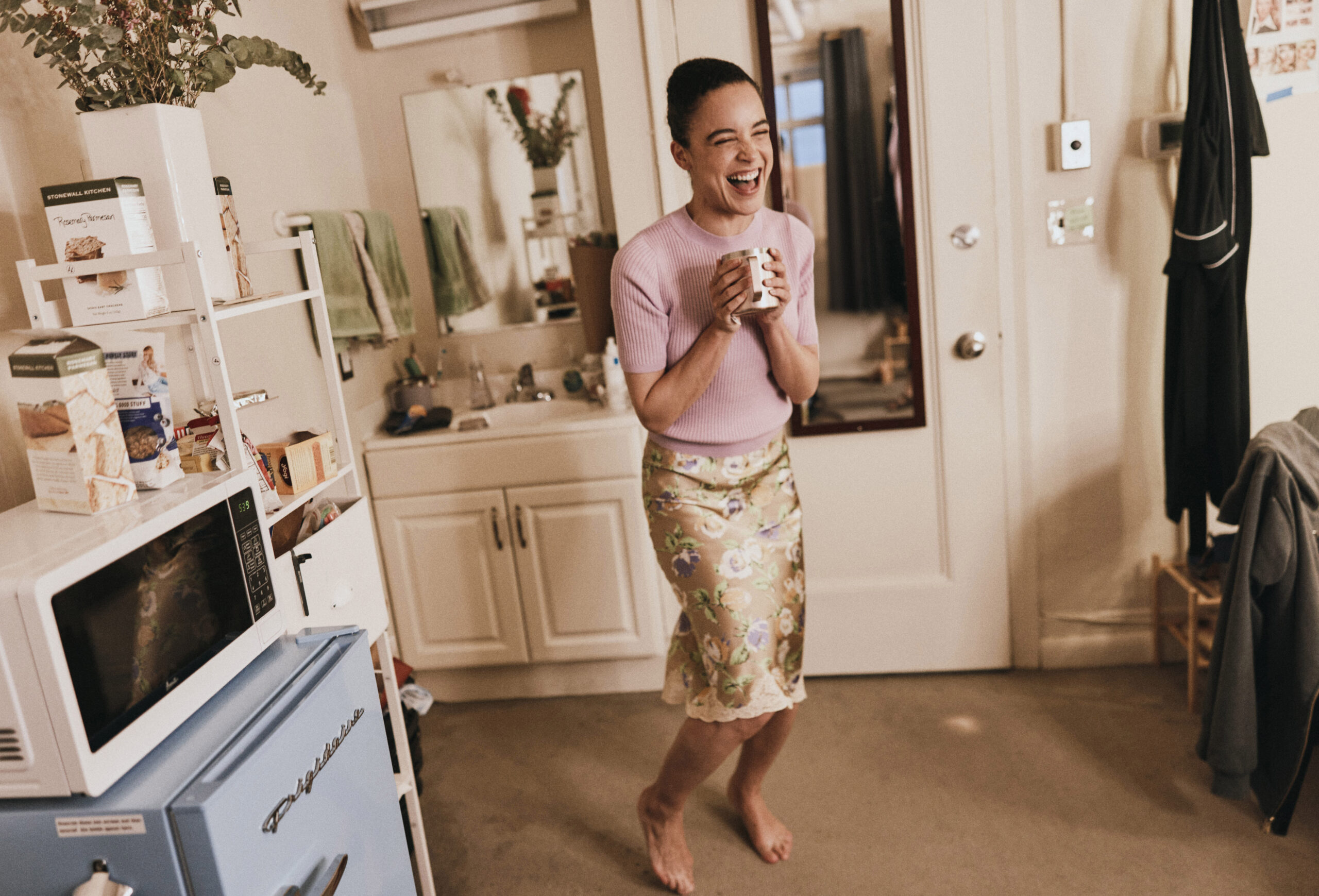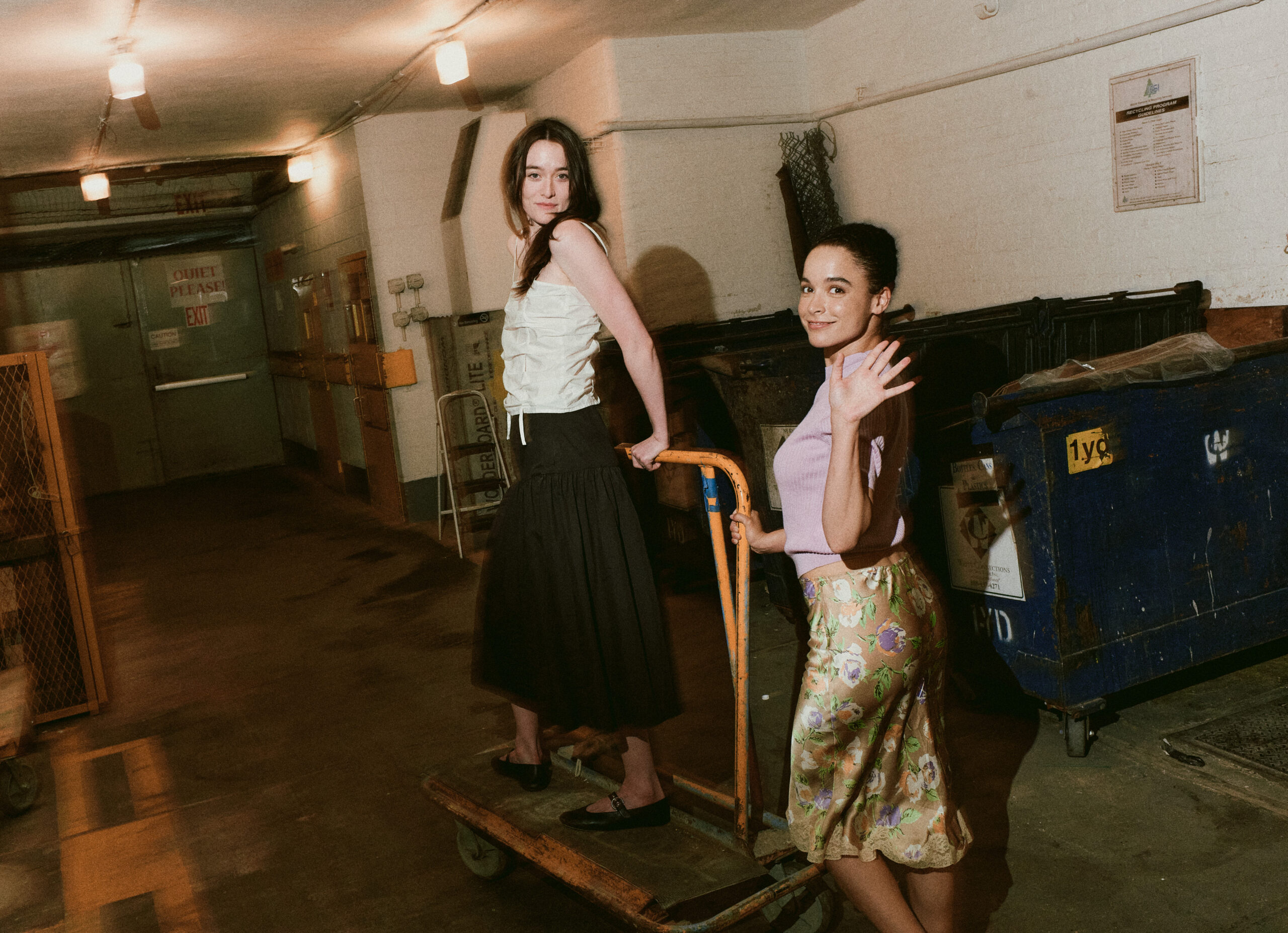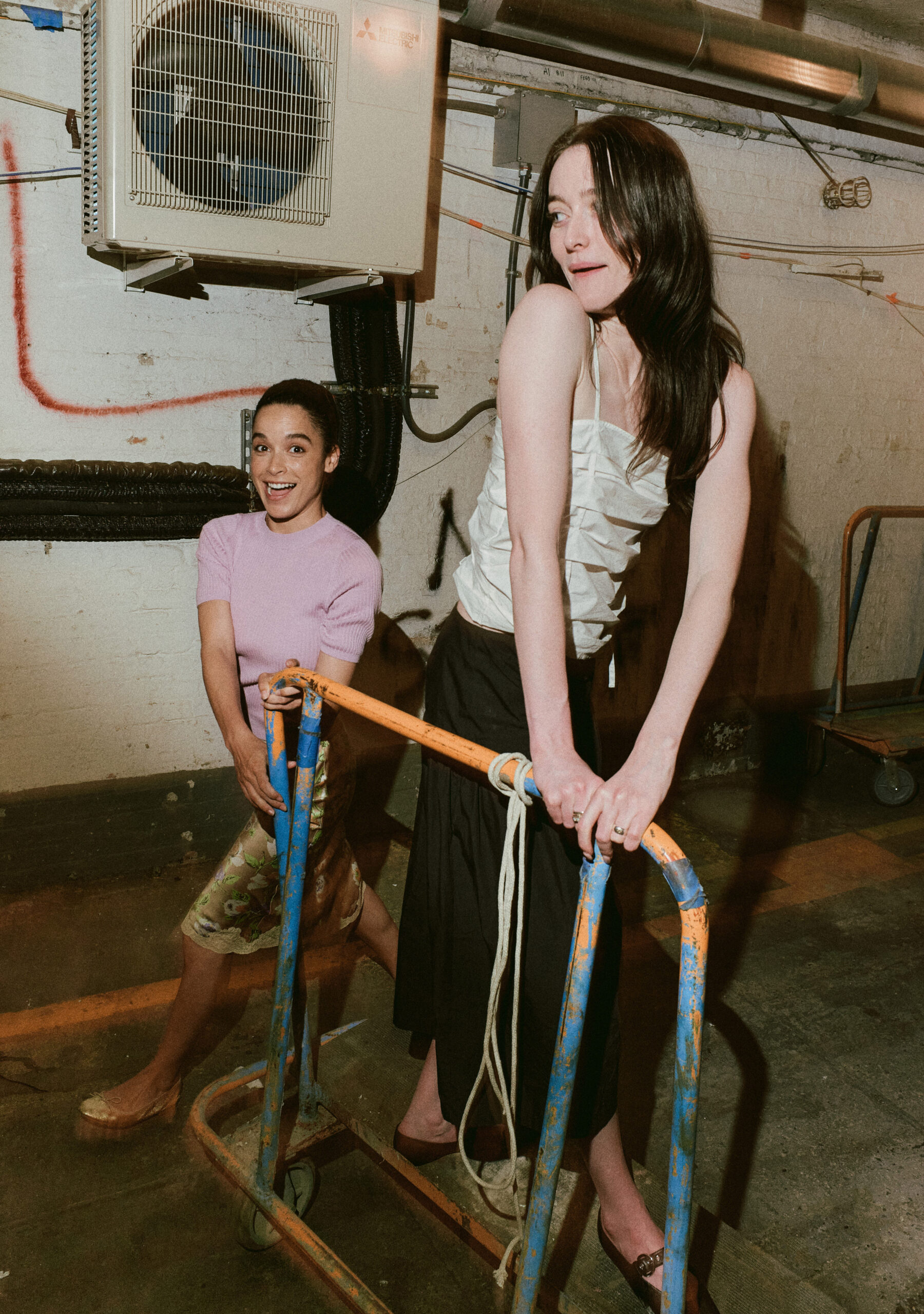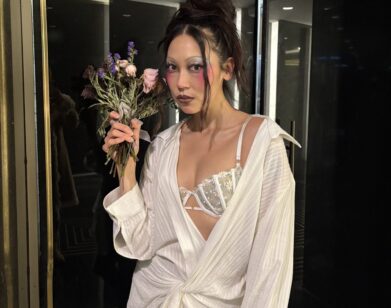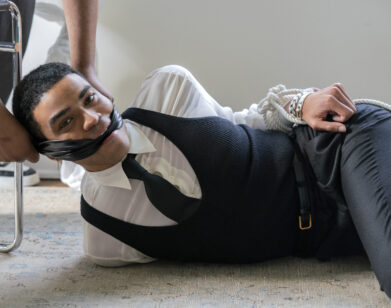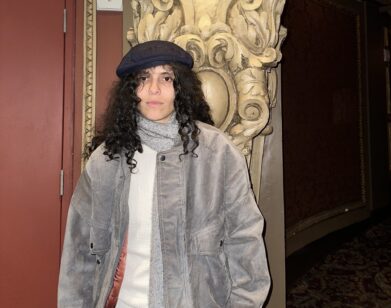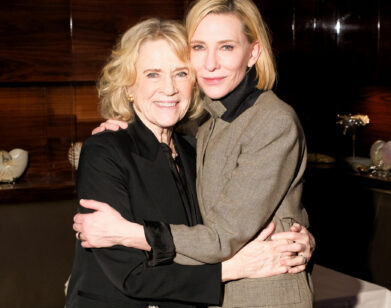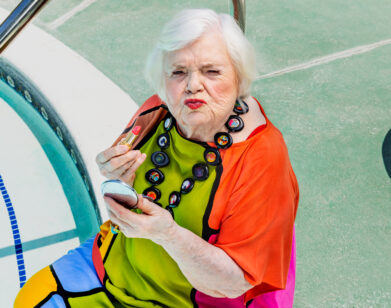BACKSTAGE
The Ladies of Stereophonic Take Jeremy O. Harris Inside the Year’s Hottest Play
In October of 2020, Jeremy O. Harris’s Slave Play became the most nominated non-musical in Tony Awards history, garnering 12 nominations for everything from sound, lighting, and costume design to direction, score, and five of its principal actors. This year, a different play in the same theater—The Golden, on 45th Street—broke the record with 13 nominations: Stereophonic, written by the American playwright David Adjmi, who began working on the production back in 2014 with Arcade Fire’s Will Butler. The three-plus-hour epic, which first premiered at Playwrights Horizons last fall, follows a fictional 1970s rock band (one whose internecine tensions and turmoils resemble those of Fleetwood Mac) as they hole up in a studio in Sausalito to record what might be—if all goes well—their magnum opus. Inevitably, powders are snorted and personalities clash, but the band’s creative synergy is undeniable. Essential to the production are the Tony-nominated performances of Sarah Pidgeon and Juliana Canfield, playing Diana and Holly, respectively, the band’s two female members who often find themselves iced out by the outsized egos (and self-destructive habits) of their bandmates.
Behind the scenes, as they told Jeremy O. Harris on Zoom last week, the actors share a dressing room and have forged a kinship not dissimilar to the one they demonstrate on stage. “We get acupuncture every week,” says Pidgeon. “Juliana takes the couch one week, I take the cot, then we switch. It’s very democratic.” As the Tony Awards approach, they gave their fellow Golden Theatre alum a peek behind the curtain, dishing on their first trip to the Met Gala, growing up at acting camp, and life as a Broadway vampire.
———
JEREMY O. HARRIS: You guys look gorgeous!
SARAH PIDGEON: Thanks, we have a press day.
HARRIS: I heard you guys were talking to CBS.
JULIANA CANFIELD: We’re hitting all the mainstream news outlets.
HARRIS: Well, listen. I have some fun questions for you, ‘cause Interview’s a fun place. First is, what was it like to be at the Met Gala and then leave the Met Gala and go to an after-party, where you were called on stage to sing with Jon Batiste?
CANFIELD: It was kind of an out-of-body experience. I mean, we ran into you. I was so happy to see you. It’s a crazy party, obviously, so anytime there’s a familiar face, it’s like a life raft. Energetically, I was feeling clingy towards you. And then Jon Batiste was like “Sarah and Juliana, play us a song.” And my first instinct was, “Absolutely not.”
PIDGEON: “No way.”
CANFIELD: We’re not prepared. This is too scary.
PIDGEON: You don’t wanna hear us.
CANFIELD: But then, what happened was—
PIDGEON: Your friend and his wife—
CANFIELD: What friend?
PIDGEON: I think it was Kiera [Culkin].
HARRIS: Your friend, Kieran Culkin.
CANFIELD: [Laughs]
PIDGEON: His wife Jazz [Charton] was like, “If you don’t do it now, it’s so much worse than if you do it and it’s bad.”
CANFIELD: She was like, “You just have to go.” It’s kind of like if you’ve ever been to a body of water with a big cliff, you just have to jump.
PIDGEON: The longer you wait, the worse it’s gonna get. But I was shaky.
CANFIELD: I was shaky too.
PIDGEON: We played some wrong notes.
CANFIELD: Lots.
PIDGEON: Also, the entire night, I was very anxious about losing my voice because we had a show the next day.
CANFIELD: Everyone was like, “Come to the Loewe party.” And we were like, “We have to go home because we have to protect the instrument.”
PIDGEON: I don’t know how I would have done that night without Juliana.
CANFIELD: It was so much fun having you. It was like a really big, fun wedding without a bride and a groom. And everyone was in much better outfits.
HARRIS: Well, I went to my first Met Gala with a friend as well and that was the best gift. Hari Nef had just been in my play and she and I were both invited with Gucci. It was the most surreal experience. You need someone you know to hold on and be like, “Wait, did I actually just see Kim Kardashian talking to Jeff Bezos?”
CANFIELD: 100 percent. It was very grounding. I thought it was an authentically great party.
HARRIS: It is truly one of my favorite things in New York and there’s nothing that makes me feel like more of a New Yorkert. Which brings me to another question I have for both of you. Juliana, you’ve spoken to me quite blatantly about your dream of being a theater actress from a very young age. Sarah, did you also have a plan for this?
PIDGEON: My great-aunt came to the show and she was like, “You said as a little girl that you were going to be an actress.” Personally, I don’t remember a time that I thought I was going to do this. But also, I think I’m lying to myself.
CANFIELD: Yeah, you went to acting camp…
PIDGEON: I went to acting camp. Like, it’s always been a thing.
CANFIELD: And acting boarding school.
HARRIS: You went to acting boarding school?
PIDGEON: Yeah, I went to a summer camp that turned into a boarding school called Interlochen.
HARRIS: Wait, you went to Interlochen? I was so jealous of kids who got into Interlochen. I applied in eighth grade and didn’t get in. Interlochen and Walnut Hill were my dreams.
PIDGEON: It was a pretty special place.
HARRIS: You guys had to wear all black there, right?
PIDGEON: It was all blue.
CANFIELD: There was a dress-code at acting school?
PIDGEON: At summer camp and during the school year. There were a lot of talented young people. But nothing has gone the way I ever expected it to go in my career. Like, I didn’t know this thing was coming along in the last year and feels incredibly surreal. And working with Juliana has been the most surreal part of it. You know everything about me, like the inner monologue that’s going through my head, and such an incredible friendship has formed.
CANFIELD: My favorite part of the day is when we get to the dressing room and we just vent or gossip for an hour while we’re steaming.
PIDGEON: We didn’t get to do it the other day.
CANFIELD: And it threw off our show.
PIDGEON: It was like, “Today feels weird.”
HARRIS: This is so funny too because I feel like you guys chose to be in the same dressing room, right? Because when I was in the Golden [Theater], I think there were plenty of dressing rooms for you guys to have your own, right?
CANFIELD: We could have been separate, but they kind of discouraged separation.
PIDGEON: We have a couch and we get acupuncture every week. Juliana takes the couch one week, I take the cot, then we switch. It’s very democratic.
CANFIELD: I would be lonely if I were in a room alone.
HARRIS: Are you a clean girl, or are you messy sometimes?
PIDGEON: I’m clean, but I can get messy.
CANFIELD: Mm-hm. I would say I’m middle of the road. But I’m looking at my area right now and it looks gross.
HARRIS: What’s gross? Like, makeup stains or something?
CANFIELD: No, there are Bandaids….
PIDGEON: Unused Bandaids.
CANFIELD: It’s a little cluttered. Actually, when my parents came to the theater, my mom was like, “Sarah’s much neater than you are.” [Laughs]
HARRIS: Well, we’ll go into the moms of it all in a second, because your mom is one of my favorite people ever. But I have one more question about your journey. Sarah, are you now the most successful person from your class at Interlochen? Is anyone else doing this?
CANFIELD: Whoa, that’s a very intense question.
HARRIS: Listen, we all went to drama school, so we know we’re all thinking it. [Laughs]
PIDGEON: Well, some of us aren’t acting anymore. Some are, some are writing. I wouldn’t say I am the most successful. But to be on Broadway, coming from theater school, it’s really exciting. Our names are on 45th on a marquee, and that’s pretty cool.
HARRIS: And you’re in the best theater on Broadway, in my opinion.
PIDGEON: The Golden is golden.
CANFIELD: Well, you were in the Golden.
HARRIS: Yeah. It’s my favorite theater. My grandpa died right before I was given the Golden and his name was Golden.
CANFIELD: That was kind of written in the stars. You were so close to your grandfather.
HARRIS: Yes. This is written in the stars for you, too. Is being on Broadway and getting your first Tony nomination for your first play on Broadway fitting the plan?
CANFIELD: I mean, it wasn’t in the plan. To do a new play on Broadway and originate a role and do it with the original cast and feel really integral to the creation of the play—I don’t think I really ever thought about that.
PIDGEON: There was no putting my finger on this. I don’t know what I would be doing if it wasn’t this play because there is no room for plan B. There’s no room for extracurriculars that fill your cup. Like, it’s this. And it’s sort of always going to be this, because I don’t know what else I would be doing.
CANFIELD: Sleeping. Going on vacation, maybe.
HARRIS: You know, one of the things I think about when I see your play is that there’s nothing better than being in an ensemble where everyone’s being celebrated. And yet, the thing that pisses me off about the Tony’s is that they don’t allow a celebration of the ensembles outside of individual nominations. Are you guys willing to join my fight to make the Tonys give a Best Ensemble award?
PIDGEON: Yes!
CANFIELD: 100 percent. This year alone, there’s overwhelming evidence that that kind of recognition is necessary. We did win a Drama Desk Award for best ensemble, though.
HARRIS: That was amazing!
PIDGEON: We pick it up next week.
HARRIS: What did your parents say when this happened?
PIDGEON: We immediately started crying. Our parents and our family have seen every show since we were little babies.
CANFIELD: How many times has your mom seen the show?
PIDGEON: Three times.
CANFIELD: But she lives in Michigan. My parents have seen it a lot of times. They’re so proud. I don’t know, I get a little choked up every time I think about it.
HARRIS: Who’s been the most surprising fan that you guys have met? Or who brought out the fan in you when they came backstage to say they loved the show?
PIDGEON: People don’t come back!
CANFIELD: Yeah, no one comes backstage.
HARRIS: I’m flabbergasted.
CANFIELD: Well, Ellen Burstyn came backstage.
PIDGEON: That was incredible.
CANFIELD: That was major. She came back and she was like, “I felt like I was watching you live on stage.” And coming from her…
PIDGEON: An icon.
CANFIELD: I mean, she’s an OG. That was kind of crazy.
PIDGEON: Sometimes, when I hear that there’s a really famous person in the audience, I’m like, “Oh wow, out of their busy schedule, they want to sit and watch this long show?” Like, I don’t get stopped on the street.
HARRIS: I would stop you on the street.
CANFIELD: I got stopped in Carroll Gardens. I think a lot of our viewers live there.
HARRIS: So, it’s a Brooklyn show? Is that what you’re saying?
CANFIELD: It’s a Brooklyn show. Not like an oontz-oontz show, but it’s Brooklyn.
HARRIS: I love that.
PIDGEON: Jeremy, I stopped you on the street years ago.
HARRIS: You did?
PIDGEON: Maybe I had just seen Daddy. And I was like, “You’re Jeremy O. Harris, right?”
HARRIS: Oh my god. Was I a bitch? Did I give bitch?
PIDGEON: No, no, no. Apart from me telling you that we had mutual friends, the conversation was short and sweet.
HARRIS: I’m really curious, do you guys plan on coming to London with the show? Because I’m sure it’s going to come…
PIDGEON: I mean, I would love to do this show in different iterations.
CANFIELD: I’m a little scared of the idea of doing it in England. Not like, prohibitively so, but because my character’s British—
PIDGEON: But multiple Brits have come to the show and said that your accent is really good.
CANFIELD: But there are some who aren’t saying anything who think my accent is “shite,” probably.
HARRIS: But here’s the thing. I love all of my British actors, and everyone I’ve ever worked with who’s British, they’re bad at accents. They are not good at American accents. They think they are, but they’re not.
CANFIELD: I know. But they get a lot of leeway because Brits just… get a lot of leeway.
PIDGEON: But also, there’s that argument we made that Holly has been in America for a while and her accent has changed.
HARRIS: Yo… that’s good. It’s like if Madonna lived in Europe, you know?
CANFIELD: Exactly. And Lindsay Lohan. I’m joining a great tradition of transatlantic accent work.
HARRIS: [Laughs] Okay, so what is your ritual when you come offstage? How do you wash off the show?
PIDGEON: Well, we get these towels that have rose geranium. Our incredible dresser Julian preps them for us and we put them in the microwave. Makeup comes off and Juliana is up the stairs, quick as sticks, taking the wig off.
CANFIELD: Wig. Off.
PIDGEON: I’m pretty bad at knocking on the door, I’ll just open the door and—
CANFIELD: She’s constantly flinging the door open and I’m butt-naked.
PIDGEON: But I’m working on it. We just try to get out of here fast.
HARRIS: Do you ever feel like saying “fuck you” if someone says, “That was long.”
CANFIELD: I mean, “Yeah, we know.” [Laughs] “It is long.”
HARRIS: It’s a long show, but some of the best are. Do you guys both have partners?
PIDGEON: Mm-hmm.
CANFIELD: You know mine.
HARRIS: I know yours but I mean, things change. You’re a hot Broadway commodity now. Who knows?
CANFIELD: There’s not a whole lot of time to be single and mingling. But no, I’m very happily still with Edmond.
HARRIS: What do your partners think of what’s going on?
PIDGEON: I mean, Edmond understands it more because he’s been on Broadway.
CANFIELD: Well, he’s an old Broadway-head, along with like half of my class from Yale. He’s really excited. He’s a big fan of the show and it’s really nice to come home to someone who understands all of the petty dramas that come with being in a play. He’s seen the show like, five times.
PIDGEON: That’s like, sixteen hours.
HARRIS: That’s beautiful. The reason I ask is because my partner doesn’t do this and there is a toll. I’m missing two weddings to be here and he’s gonna be dateless. It’s both the dream I’ve had since I was little, to be able to do what I love all the time and make a little bit of money doing it, but it’s also frustrating that we become creatures of the night. Like, true vampires.
CANFIELD: And our weekend doesn’t line up with regular people weekends.
HARRIS: Your weekend is a Monday.
PIDGEON: And it’s like, the restaurants are closed. No one’s going that hard on a Sunday. I tried to go hard this past Sunday and that didn’t go that well.
HARRIS: Okay, my last little question. Now that you guys have played creatures of the 70s, what is the next era you’re ready to tackle?
CANFIELD: You know I love a Chekhov play, Jeremy. And I would love to do something set in the late 19th, early 20th century. Put me in a corset, long dress, big up-do. I mean, I would love to be on The Gilded Age.
HARRIS: I love you in a corset too.
CANFIELD: We’ve got to get me in a corset.
PIDGEON: I think I’m similar. Like I sort of have a face that looks like, “Colonial woman.” This is going to be such a hard act to follow, but I just want to be in a project that has a point of view. I want to work with someone who has such a strong taste and opinion that I can sort of bounce against them. I always find I’m the most creative when there are slight boundaries on me.
CANFIELD: Like a corset.




